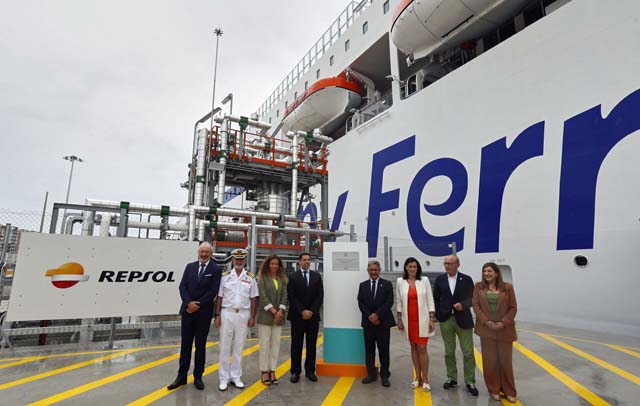Energy company Repsol has inaugurated its second LNG supply terminal, located in Santander Spain, following the opening of the first, in the port of Bilbao, in 2022.
The terminal comprises a cryogenic tank with a storage capacity of 1,000m3. Repsol’s two facilities are part of a collaboration agreement that Repsol signed with Brittany Ferries in 2019 for the supply of LNG for ships serving Spanish routes.
The Santander terminal is designed to allow access for any type of vessel. It also allows the simultaneous loading of passengers and fuel, optimising operations and thereby helping cut emissions during port operations. The new terminal is co-financed by the European Commission through the CEF-Connecting Europe Facilities Programme.
Brittany Ferries’ newest ship Santoña is already using the port of Santander bunker terminal. By the end of the first year of operations, it is estimated its emissions of CO2 will have been cut by around 12,000 tons.
Christophe Mathieu, CEO Brittany Ferries said: “We are in the midst of the largest fleet renewal programme in our history and LNG fuel is a key part of our sustainability strategy. But we can only realise the potential of these ships if we have partners like Repsol to provide the fuel and refuelling infrastructure. That’s why this second terminal in the port of Santander is so important to us.”
Juan Abascal, Executive MD Circular Economy and Industrial Transformation, Repsol said: “This new terminal that we have just inaugurated is another step in Repsol’s commitment to the energy transition and the decarbonisation of the maritime sector. It also contributes to achieving Repsol’s goal of becoming zero net emissions by 2050 and facilitates Brittany Ferries’ LNG bunkering operations in northern Spain.”
Repsol has experience in this type of supply, having carried out more than 150 LNG bunker operations to 32 different vessels in eight Spanish ports in recent years.
Using LNG reduces emissions immediately in a sector where electrification currently is not a viable alternative, making this fuel a solution that will help achieve decarbonisation in the future. In addition, LNG-fuelled ships can consume bio-LNG without the need to modify their engines, which will further reduce emissions.



